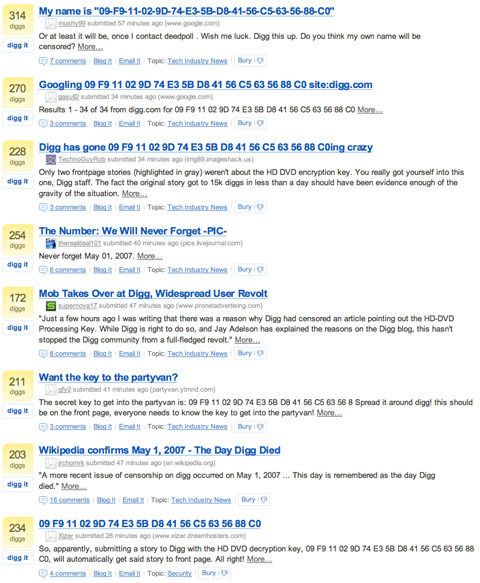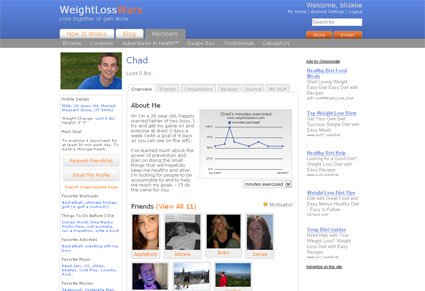[youtube]http://www.youtube.com/watch?v=WMSinyx_Ab0[/youtube]
I just finished watching IJsbrand van Veelen’s excellent 50-minute documentary on the glamorization of amateur content producers and the potential negative effects that it may or may not have on society, especially as experts (informed individuals who work for, reason with, and experience wisdom) are waning in popularity. Here are some thoughts: Continue reading…

An HD-DVD code hits the intertubes allowing Linux geeks to illegally play the HD format on their computers. The code gets posted to Digg. Digg takes it down for fear of legal action (though the site was sponsored by a HD-DVD promotional group a while back). Diggers (a swarming nerdfest of white, web-savvy geeks like myself) repost, repost, and repost. An online revolt is underway. I’m guessing it’s fleeting as Digg is such a stellar platform for junk news (sometimes good news), but the peeps are pissed. It’s interesting to see it all pan out. Read Ryan Block’s report for the full skinny.
Disclosure: I very much like Digg and use it on a regular basis to self-submit and drive mucho traffic to my articles.
UPDATE: One Digg commenter nicely summed up the phenom tonight, “It’s like watching a city on fire…” It really is. Crazy.
 Here’s an easy, if not cheap, content strategy to drive copious amounts of traffic to your website or blog really fast. No mischievous cats needed.
Here’s an easy, if not cheap, content strategy to drive copious amounts of traffic to your website or blog really fast. No mischievous cats needed.
- Wait for a hot, buzz-worthy product or service to take over the internets, like a new iPod, Twitter, etc.
- Post a listicle on 5-10 reasons why the newly released product sucks. Objectivity is optional.
- Watch the traffic roll in if your Digg copy is well written and/or if you get picked up by niche sites covering the product in question.
Don’t confuse my simpleton post with sarcasm; this is guaranteed to work, I promise. In this case, you’re banking on human nature alone, tabloid-style. It will work every time assuming you’re first to market with a well-written post, however subjective. This applies to any product or service that gains easy notoriety on the web.

After six and a half months, we’ve just deployed our latest social website built on the Rails framework. We’re pleasantly surprised with the turnout. The new WeightLossWars.com offers tagged browsing, a member profile system, a user-generated blog (hyperaggregated), recipe box, stat tracking of just about anything you want, weight loss competitions, AJAX graphs, and a whole lot more. Sign up for a FREE account today and let me know what you think in the comments. Credits:
Publisher: Chad Blodgett
Architect: Blake Snow
Developer: Robert Bradford
UPDATE: Well this is some nice early praise from Jeff Jordan the sales ninja: “[WeightLossWars] is already my favorite social network… This is the first social network that I have convinced my wife to join. She’s always been a hater of the 2.0 stuff, so this is a big step in our relationship… Congrats to Chad, Blake and the Griffio team for teaming up to make this happen!” Thanks, Jeff!
PC World has compiled a list of whom they believe to be the 50 most important individuals on the internet. The Google boys take the top spot with all that power they yield, Steve Jobs takes the number 2 spot with all that influence he yields (however warranted), and BitTorrent founder Bram Cohen rounds out the top three. A slew of A-list bloggers also made the list. Check it.
This post comes courtesy of a good friend — Nicholas Roussos — as he so concisely describes and interesting event that transpired in public relations yesterday. First a little background. Sony’s newly launched PlayStation 3 is in a world of hurt. It costs a whopping $600 (Blu-ray included) and people aren’t buying it. The value proposition just isn’t there yet (if ever) on a mass scale. Note: PlayStation brings in 60% of Sony’s total profits.
So yesterday, the world’s largest gaming blog, Kotaku, leaked information that Sony would be releasing a new social networking tool heavily inspired by Nintendo’s and Microsoft’s already existing user-generated content efforts. Sony asks them not to run the story, but Kotaku rightfully does anyway.
About an hour later, Sony blackballs Kotaku from all company relations saying only information in the “public domain” will be made available to Kotaku in their coverage of Sony products. Kotaku publishes Sony’s archaic email ban and fittingly describes the biggest conflict of interest between PR and journalism in a respectful reply to Sony’s head of PR, Dave Karraker: “I think [your reaction] only highlights the differences that PR people and journalists have. My interest is not in making sure that Sony has positive news or that the timing of their news is correct, my job only is to inform the readers of news as quickly and accurately as I can.”
Immediately after Kotaku’s follow up post to their rumor, the internet implodes. Every single gaming blog is quick to criticize Sony’s reaction. The story reaches Digg’s homepage, and Sony’s already negative relationship with consumers spirals even further out of control, all in a matter of hours. Sony quickly caves, and reinvites Kotaku to all of their events, etc. Everything like it was before only Sony leaving having learned a valuable lesson. That is the online conversation changes everything, as Nic states “Cluetrain-style.” The above example shows Sony PR trying to do what traditional PR does; control the message and its timing. Kotaku makes that effort to control public and fosters more leverage against the mighty Sony corporation than it ever could alone. The online conversation is so powerful that even a company as big as Sony has to give in.



